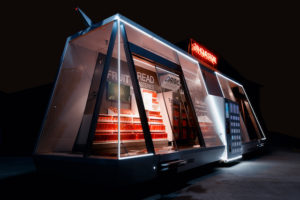Retail trade is in the wake of big changes. China is testing the first autonomous store on the wheels that no longer requires manpower and is able to drive to the address given by the customer.
The future stores are referred to as places of purchase that operate without manpower thanks to automated processes. Amazon is a pioneer in this field, having opened a grocery store that uses sensors which identify goods taken from the shelves and add these to the customers’ Amazon account, unless placed back on the shelves. It may sound ambitious, but several online retailers are making their first steps in that direction.
A Swedish start-up, in cooperation with a Chinese university, has taken the vision one step further – they have designed an autonomous store that not only operates without manpower but will drive directly to the shopper’s doorstep.
Retail trade as we know it will disappear
In Shanghai, which is the largest populated city in China, has launched the first mobile and autonomous test store on the streets that operates without manpower and can turn any parking lot into a potential store open 24/7. The store, developed in cooperation between the Swedish start-up Wheelys, the Hefei University and the Himalaty company, is in the beta-testing phase which means that in addition to the existing framework, several options will be added to it in the future.“Over the coming decades, retail trade as we know it will disappear,” believes
Per Cromwell from the Wheelys company.

The prototype moving about the streets of Shanghai currently undergoing tests is still being controlled by people, but its creators state that the next version will be computer-managed and will use artificial intelligence and machine vision to move and get to the customer.
The plan is that stores will restock themselves at warehouses on their own, and customers will be able to order the stores to their address.
According to the founders, the electricity-powered store, which is equipped with solar panels, is almost the most environmentally friendly store on the market.
Convenience goods available around the clock
The developers predict that Moby Mart will provide convenience goods, such as milk, lunch and medicine around the clock. “You just step in the store, take what you need and leave.”Customers wishing to make a purchase will choose the goods, scan them with their smartphone and place the items in the basket. The amount will be automatically withdrawn from the customer’s bank account, making the whole buying process very comfortable for the customer.
At the moment, one prototype is driving around China, but several additions will be launched on the market next year. According to Wheelys, the store’s estimated cost will remain under USD 100,000, amounting to only a tenth of the cost of building a traditional store, and there are big plans for the next year.
“The slow decay of retail trade will also uproot small villages. We are offering a simple solution to rectify the situation – stores without manpower,” explains Robert Ilijason from Wheelys.
“It is a simple store that is used the same way anywhere in the world, be it China, Alaska or Manhattan, USA. It can be used anywhere and is open 365 days a year and 24 hours a day,” is written on the company’s website. While the decay of retail trade tends to uproot life in the countryside, Moby Mart has a cure – the store can be used anywhere in the world and as it does not need manpower, any parking lot can be turned into a shopping mall.
However, it will probably take some time before this store will become a reality in our streets – the vehicle seems quite clumsy, it is not self-driving yet, and although there are promises that goods will be delivered to customers with drones as well, it is yet unclear how and when that will be achieved.
